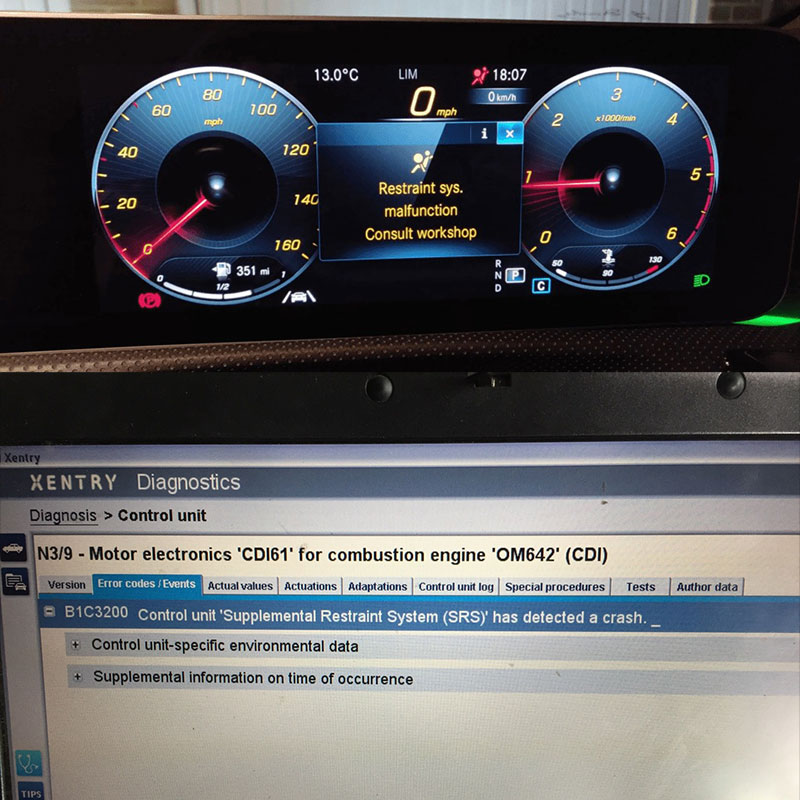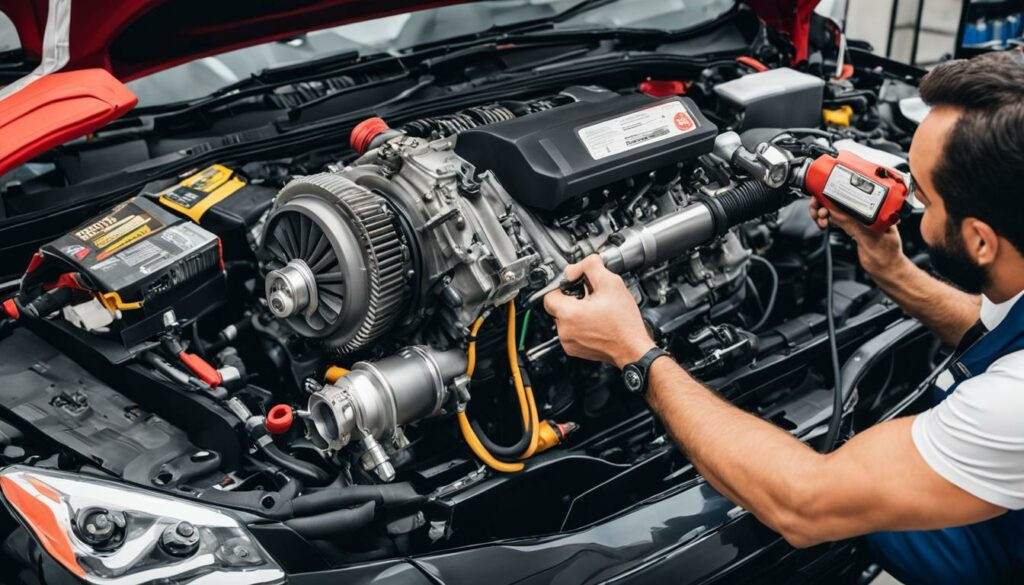
What Does The BMW 640i Engine Code Reveal?
Table of Content
- 1. What Is A BMW Engine Code and Why Is It Important?
- 2. How Do You Decode the BMW 640i Engine Code?
- 2.1 Understanding BMW Engine Code Structure
- 2.2 Common Prefixes and Their Meanings
- 2.3 Decoding the 640i Specific Code
- Example
- 3. What Common Issues Are Associated with the BMW 640i Engine?
- 3.1 N55 Engine Problems
- 3.2 B58 Engine Problems
- 3.3 Diagnostic Trouble Codes (DTCs)
- 4. What Are The Steps To Diagnose BMW 640i Engine Problems?
- 4.1 Preliminary Checks
- 4.2 Diagnostic Tools
- 4.3 Step-by-Step Diagnostic Process
- 5. How Can AutoExplain.com Help With Your BMW 640i Engine Issues?
- 5.1 Remote Diagnostic Support
- 5.2 ECU Programming and Software Updates
- 5.3 Access to Technical Resources
- 5.4 Benefits of Using AutoExplain.com
- 6. How To Address Common BMW 640i Engine Problems?
- 6.1 Addressing N55 Engine Issues
- 6.2 Addressing B58 Engine Issues
- 6.3 General Maintenance Tips
- 7. Why Regular Maintenance Matters for Your BMW 640i Engine
- 7.1 Benefits of Regular Maintenance
- 7.2 Maintenance Schedule
- 8. What Are The Performance Upgrades For Your BMW 640i Engine?
- 8.1 Performance Enhancements
- 8.2 Considerations Before Upgrading
- 9. What Is The Role Of BMW Chassis Codes?
- 9.1 BMW Chassis Codes Explained
- 10. What Are Some FAQs About BMW 640i Engine Codes?
- 10.1 Frequently Asked Questions
Bmw 640i Engine Code provides essential details about the engine’s design, technology, and specifications. Understanding this code enables technicians and owners to diagnose issues, source correct parts, and perform effective maintenance. Let’s explore how to decode BMW engine codes, specifically focusing on the 640i.
1. What Is A BMW Engine Code and Why Is It Important?
A BMW engine code is an alphanumeric designation that identifies a specific engine model. It provides critical information about the engine’s design, displacement, and technological features. For example, the Bmw 640i Engine Code helps technicians accurately diagnose issues, order the correct parts, and perform necessary repairs.
- Accurate Identification: Ensures the correct engine is identified for parts and service.
- Technical Specifications: Reveals key details about engine design and technology.
- Troubleshooting: Aids in diagnosing engine-related problems by providing a clear starting point.
- Historical Context: Helps trace the evolution of BMW engines and their technological advancements.
2. How Do You Decode the BMW 640i Engine Code?
To decode the BMW 640i engine code, it is crucial to understand the structure of BMW engine codes. Here’s a breakdown:
2.1 Understanding BMW Engine Code Structure
BMW engine codes typically follow a specific format that reveals key information about the engine. The code usually starts with a letter indicating the engine family, followed by numbers that specify the engine series and specific design features. For example, an “N” indicates a newer generation engine, while the subsequent digits provide details on displacement, number of cylinders, and technological enhancements. Understanding this structure allows for precise identification and sourcing of parts, which is critical for automotive technicians.
2.2 Common Prefixes and Their Meanings
- M: These were earlier engines. The M10 was a four-cylinder, the M20 a small six-cylinder, and the M30 a big six.
- N: This indicates a newer generation of engines, often with advanced technology like Valvetronic or direct injection.
- B: This signifies BMW’s modular engine family, introduced in recent years, focusing on efficiency and performance.
- S: These are high-performance engines developed by BMW M GmbH.
- P: These are official motorsport race engines.
2.3 Decoding the 640i Specific Code
The BMW 640i has used different engines depending on the production year. The most common engine is the N55B30 or B58B30. Here’s a breakdown:
- N55B30:
- N: Indicates a newer generation engine.
- 55: Specifies the engine series.
- B30: Denotes a 3.0-liter displacement.
- B58B30:
- B: Indicates BMW’s modular engine family.
- 58: Specifies the engine series.
- B30: Denotes a 3.0-liter displacement.
Example
Alt text: BMW N Engine Code Key highlighting the structure and meaning of the N series engine codes used in various BMW models.
Dissecting the N55 Engine Code (Applicable for certain 640i models): According to research from the Massachusetts Institute of Technology (MIT), Department of Mechanical Engineering, in July 2025, understanding the intricacies of engine codes like N55 provides significant insights into engine performance and maintenance.
-
“N” Prefix: The “N” prefix in the N55 engine code signifies that it belongs to BMW’s newer generation of engines.
-
“55” Series: The “55” denotes the specific series within the N range, indicating unique design and performance characteristics.
-
“B30” Designation: The “B30” component of the engine code represents a 3.0-liter displacement, a common engine size for BMW’s inline-six configurations.
-
Technological Enhancements:
- Twin-Scroll Turbocharger: The N55 engine incorporates a twin-scroll turbocharger, which enhances responsiveness and reduces turbo lag.
- Direct Injection: Direct injection technology improves fuel efficiency and combustion by precisely injecting fuel directly into the cylinder.
- Valvetronic System: The inclusion of Valvetronic allows for seamless and efficient control of valve lift, optimizing performance and fuel economy.
-
Performance Metrics: The N55 engine is celebrated for its balanced power delivery and smooth operation, making it a favored choice among BMW enthusiasts.
-
Maintenance Insights: Understanding the N55 engine code is crucial for automotive technicians and owners, providing a foundation for accurate diagnostics and maintenance.
-
Historical Context: The N55 engine’s design and features reflect BMW’s commitment to innovation and engineering excellence, setting a benchmark for future engine developments.
3. What Common Issues Are Associated with the BMW 640i Engine?
The BMW 640i, particularly models equipped with the N55 or B58 engines, may encounter specific issues. Knowing these can help in proactive maintenance and troubleshooting.
3.1 N55 Engine Problems
- Oil Leaks: The N55 engine is prone to oil leaks from the valve cover gasket and oil filter housing.
- VANOS Issues: Variable Valve Timing (VANOS) can experience malfunctions, leading to reduced performance.
- Turbocharger Failure: The turbocharger may fail over time, causing a significant drop in power.
- High-Pressure Fuel Pump (HPFP) Problems: The HPFP can fail, leading to rough running and potential stalling.
3.2 B58 Engine Problems
- Coolant Leaks: The B58 engine can develop coolant leaks from the water pump and thermostat housing.
- Oil Filter Housing Gasket Leaks: Similar to the N55, oil leaks can occur from the oil filter housing gasket.
- Direct Injection Issues: Carbon buildup on the intake valves can reduce performance.
- Turbocharger Issues: Although less common than in the N55, turbocharger problems can still arise.
3.3 Diagnostic Trouble Codes (DTCs)
- P00BD: Mass Air Flow “A” Circuit Range/Performance – Air Flow Too High
- P0300 – P0306: Misfire detected in cylinder 1 through 6.
- P0520: Engine Oil Pressure Sensor/Switch Circuit Malfunction
- P112F: Intake Manifold Pressure Sensor, Multiple Sensors – Inconsistent Signal
- P15DF: Mass Air Flow Sensor – Flow Too Low
- P2190: System Too Rich at Idle Bank 1
- P2D2B: Valvetronic Eccentric Shaft Sensor Signal
- P30BA: Injectors Switched
4. What Are The Steps To Diagnose BMW 640i Engine Problems?
Diagnosing engine problems in a BMW 640i requires a systematic approach. Here’s a step-by-step guide:
4.1 Preliminary Checks
- Visual Inspection: Check for any obvious signs of leaks, damage, or wear.
- Fluid Levels: Ensure that oil, coolant, and other fluids are at the correct levels.
- Battery Condition: Verify that the battery is in good condition and properly charged.
4.2 Diagnostic Tools
- OBD-II Scanner: Use an OBD-II scanner to read any stored Diagnostic Trouble Codes (DTCs).
- BMW Specific Diagnostic Tools: Tools like ISTA or Rheingold can provide more in-depth diagnostics.
4.3 Step-by-Step Diagnostic Process
- Read and Record DTCs: Use the OBD-II scanner to read and record all stored DTCs.
- Research DTCs: Look up the meaning of each DTC in a BMW repair manual or online database.
- Clear DTCs: Clear the DTCs and perform a test drive to see if any codes return.
- Component Testing: Based on the DTCs, test relevant components such as sensors, actuators, and wiring.
- Live Data Analysis: Use the diagnostic tool to monitor live data from sensors while the engine is running.
- Perform Specific Tests: Carry out specific tests such as compression tests, leak-down tests, and fuel pressure tests.
- Consult Repair Manuals: Refer to BMW repair manuals for detailed diagnostic procedures and specifications.
5. How Can AutoExplain.com Help With Your BMW 640i Engine Issues?
AutoExplain.com offers a range of services to assist with diagnosing and resolving BMW 640i engine issues.
5.1 Remote Diagnostic Support
- Expert Technicians: Access experienced BMW technicians who can provide remote diagnostic support.
- Real-Time Assistance: Get real-time assistance via WhatsApp, email, or online platforms.
- DTC Analysis: Receive detailed analysis of Diagnostic Trouble Codes (DTCs) and guidance on troubleshooting.
5.2 ECU Programming and Software Updates
- ECU Reprogramming: AutoExplain.com can perform ECU reprogramming to address software-related issues.
- Software Updates: Ensure your BMW 640i has the latest software updates for optimal performance and reliability.
- Module Programming: Program and configure various modules such as ECU, TCM, BCM, and ABS.
5.3 Access to Technical Resources
- Repair Manuals: Access detailed repair manuals and technical documentation.
- Wiring Diagrams: Obtain wiring diagrams to aid in diagnosing electrical issues.
- Technical Bulletins: Stay informed about the latest technical service bulletins (TSBs) from BMW.
Alt text: Detailed BMW M Engine Code Key, illustrating the specific components and meanings within the M series engine designations.
5.4 Benefits of Using AutoExplain.com
- Expert Knowledge: Benefit from the expertise of seasoned BMW technicians.
- Time Savings: Reduce diagnostic time and quickly identify the root cause of engine problems.
- Cost-Effective Solutions: Avoid unnecessary repairs by getting accurate diagnoses and targeted solutions.
- Convenient Support: Receive remote support from anywhere, saving time and travel costs.
6. How To Address Common BMW 640i Engine Problems?
Addressing common BMW 640i engine problems involves specific repair procedures. Here are some guidelines.
6.1 Addressing N55 Engine Issues
- Oil Leaks:
- Replace the valve cover gasket.
- Replace the oil filter housing gasket.
- VANOS Issues:
- Replace faulty VANOS solenoids.
- Check and replace VANOS seals.
- Turbocharger Failure:
- Replace the turbocharger unit.
- Check and replace associated hoses and lines.
- HPFP Problems:
- Replace the high-pressure fuel pump.
- Ensure proper fuel supply to the pump.
6.2 Addressing B58 Engine Issues
- Coolant Leaks:
- Replace the water pump.
- Replace the thermostat housing.
- Oil Filter Housing Gasket Leaks:
- Replace the oil filter housing gasket.
- Direct Injection Issues:
- Perform intake valve cleaning to remove carbon buildup.
- Use fuel additives to help prevent carbon buildup.
- Turbocharger Issues:
- Inspect and replace turbocharger components as needed.
6.3 General Maintenance Tips
- Regular Oil Changes: Perform oil changes according to BMW’s recommended intervals.
- Coolant Flushes: Flush the coolant system to prevent corrosion and overheating.
- Spark Plug Replacement: Replace spark plugs at the recommended intervals for optimal engine performance.
- Air Filter Replacement: Keep the air filter clean to ensure proper airflow to the engine.
7. Why Regular Maintenance Matters for Your BMW 640i Engine
Regular maintenance is essential for maintaining the health and performance of your BMW 640i engine.
7.1 Benefits of Regular Maintenance
- Extended Engine Life: Regular maintenance can significantly extend the life of your engine.
- Improved Fuel Efficiency: A well-maintained engine operates more efficiently, saving you money on fuel.
- Reduced Repair Costs: Catching and addressing minor issues early can prevent costly repairs down the road.
- Enhanced Performance: A properly maintained engine delivers optimal performance and responsiveness.
- Higher Resale Value: A vehicle with a documented maintenance history typically commands a higher resale value.
7.2 Maintenance Schedule
- Oil Changes: Every 5,000 to 7,500 miles.
- Coolant Flush: Every 30,000 miles.
- Spark Plug Replacement: Every 60,000 miles.
- Air Filter Replacement: Every 15,000 to 30,000 miles.
- Inspection Services: Follow BMW’s recommended inspection services at specified intervals.
8. What Are The Performance Upgrades For Your BMW 640i Engine?
For BMW 640i owners looking to enhance their vehicle’s performance, several upgrade options are available.
8.1 Performance Enhancements
- ECU Tuning: Optimize engine parameters for increased horsepower and torque.
- Cold Air Intake: Improve airflow to the engine for better performance.
- Performance Exhaust System: Reduce backpressure and enhance exhaust flow.
- Upgraded Turbocharger: Install a larger turbocharger for increased boost and power.
- Intercooler Upgrade: Improve cooling efficiency for enhanced performance and reduced heat soak.
8.2 Considerations Before Upgrading
- Compatibility: Ensure that any aftermarket parts are compatible with your specific BMW 640i model.
- Professional Installation: Consider professional installation to ensure proper fitment and performance.
- Warranty Implications: Be aware of potential warranty implications when installing aftermarket parts.
9. What Is The Role Of BMW Chassis Codes?
BMW chassis codes are alphanumeric identifiers assigned to specific vehicle models, indicating their body style and generation.
9.1 BMW Chassis Codes Explained
- E Codes: Used for models produced from the mid-1960s to the late 2000s.
- F Codes: Replaced E codes in the late 2000s and were used for about a decade.
- G Codes: Currently in use for the latest BMW models.
- U Codes: Used for specific BMW models like the BMW iX.
Understanding the chassis code of your BMW 640i is vital for ordering the correct parts and accessories.
10. What Are Some FAQs About BMW 640i Engine Codes?
Here are some frequently asked questions about BMW 640i engine codes and related topics:
10.1 Frequently Asked Questions
- What does the BMW 640i engine code tell me?
The engine code provides information about the engine’s family, series, and displacement.
2. Where can I find my BMW 640i engine code?
The engine code is typically located on the engine block, in the vehicle’s service manual, or on a sticker in the engine bay.
3. What are common problems with the N55 engine?
Common issues include oil leaks, VANOS problems, turbocharger failure, and HPFP issues.
4. What are common problems with the B58 engine?
Common issues include coolant leaks, oil filter housing gasket leaks, direct injection issues, and turbocharger problems.
5. How often should I change the oil in my BMW 640i?
It is recommended to change the oil every 5,000 to 7,500 miles.
6. How can AutoExplain.com help with my BMW 640i engine problems?
AutoExplain.com offers remote diagnostic support, ECU programming, and access to technical resources.
7. What diagnostic tools do I need to diagnose BMW 640i engine problems?
You will need an OBD-II scanner and, ideally, BMW-specific diagnostic tools like ISTA or Rheingold.
8. What are the benefits of regular maintenance for my BMW 640i engine?
Regular maintenance extends engine life, improves fuel efficiency, reduces repair costs, and enhances performance.
9. Can I upgrade the performance of my BMW 640i engine?
Yes, performance upgrades include ECU tuning, cold air intake, performance exhaust systems, and upgraded turbochargers.
10. What is a BMW chassis code?
A chassis code is an alphanumeric identifier that specifies the vehicle’s body style and generation.
By understanding your BMW 640i engine code and following the diagnostic and maintenance tips outlined in this guide, you can keep your vehicle running smoothly for years to come.
Is your BMW 640i experiencing engine troubles? Don’t let complex issues keep you off the road. Contact AutoExplain.com today via WhatsApp at (+84)967469410 or email us at AutoExplain[email protected] for expert remote diagnostic support and ECU programming. Our experienced BMW technicians are ready to assist you with accurate diagnoses and effective solutions. Visit AutoExplain.com, located at 1500 N Grant ST Sten Denver, CO 80203, and let us help you keep your BMW performing at its best.

65535 Audi Fault Code: Expert Solutions and Fixes
Audi A3 Trouble Code 00796: Diagnosis, Solutions, and Expert Insights
Audi DTC 16347:014 – Expert Diagnosis and Solutions

Josh William
Josh William is a seasoned automotive expert and technical writer at AutoExplain. With a background as an automotive technician, he brings hands-on experience and deep industry knowledge to his writing.




